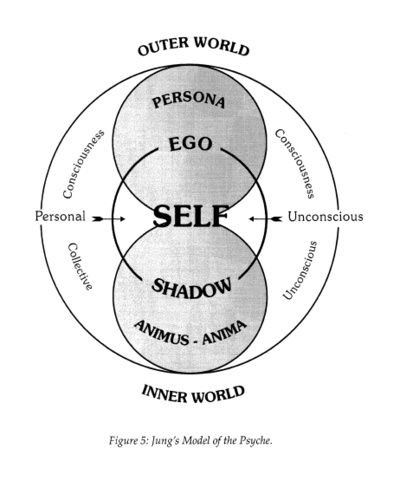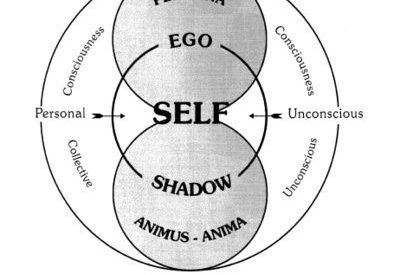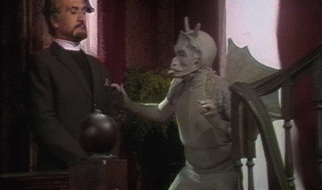In every public arena we present an exaggerated version of ourselves which we hope will make an impression. The character we display in our occupation is not the same as at home. When alone we have no one to impress, but in public we wear a mask, a persona, so that we might impose a desirable image of ourselves onto others. Every profession has subtle agreements about the manners which are acceptable, and those which are not; and it is expected that the individual will adapt to these requirements without anyone having to openly explain them. A doctor, for instance, is expected to behave as a doctor should, with a patience and sympathy that would be difficult for an ordinary person to achieve; any propensity for impatience or hostility would not be acceptable, and for good reason.
It is then the distinct purpose of the persona to subdue all of the primitive urges, impulses, and emotions that are not considered socially acceptable, and that, if we were to act upon them, would make us look fools. Anyone with any sense at all sees through the faade; but we each participate in pretending that all this is real, so that society might carry on as normal. The difficulty with the persona arises only when one becomes so closely identified with his role that he loses all sense of self. At this point the damage is surely done: he will be entirely unaware of any distinction between himself and the world in which he lives. The result of an inflated persona, Jung warned, is a ?shallow, brittle, conformist kind of personality which is ?all persona?, with its excessive concern for ?what people think.? Such a person will sacrifice himself for the wishes of others without limit ? not because he is a saint, but because he does not have the courage to refuse and endure conflict.
The Shadow
If nothing else, the persona is obedience to expectations; it is the mask one wears to convince himself, and others, that he is not an altogether bad person. But one cannot go beyond the persona until he has incorporated into his character those darker character traits which belong to what Jung called the ?shadow self?. The shadow is everything that we have denied in ourselves and cast into oblivion, or rather everything that the ego has refused to associate with itself, but that we can notice in other people ? such things might include our sexuality, spontaneity, aggression, instincts, cowardice, carelessness, passion, enthusiasm, love of material possessions. It embraces all those sins, dark thoughts, and moods for which we felt guilt and shame.
The shadow is necessarily emotional in nature, for it must oppose the rigidness of the ego; it holds its own autonomy, separate from the conscious mind. Therefore, in being instinctive and irrational, the shadow is prone to psychological projection, whereby we attribute to others all our evil and inferior qualities that we do not want to admit are in ourselves. ?A man who is unconscious of himself?, Jung writes, ?acts in a blind, instinctive way and is in addition fooled by all the illusions that arise when he sees everything that he is not conscious of in himself coming to meet him from outside as projections upon his neighbour.? (The Philosophical Tree, page 335.) When we perceive a moral deficiency in others we can be sure there is a similar inferiority within ourselves. ?If you feel?, Von Franz writes, ?an overwhelming rage coming up in you when a friend reproaches you about a fault, you can be fairly sure that at this point you will find a part of your shadow, of which you are unconscious.? If we observe our resentment towards ourselves and others, and if we consider the moral aspects of our behaviour, then we have the opportunity to bring the shadow into consciousness, and achieve a renewed sense of strength and independence.
 Source
Source
Anima/Animus
Jung believed that nested inside the shadow are the qualities of our opposite gender. The anima is the archetype that expresses the fact that men have a minority of feminine qualities; and the animus expresses the masculine qualities within women. In every man there is a woman, and in every woman a man; or rather, there is the image of the ideal man/woman, which is, as a rule, formed in part by the experience of our mother/father, and by the influence of culture and heritage. One might argue that the ideas of feminine and masculine are based on arbitrary stereotypes. But Jung presented the concepts of the anima and animus as the ancient archetypes of Eros and Logos. Eros (the female) is associated with receptivity, creativity, relationships, and wholeness.. Logos (the male) is identified with power, thought, and action. (In Ancient Greek Eros means ?love?, or ?life energy?; whereas Logos is the term for a principle of order and knowledge.)
The anima then is a personification of all feminine tendencies, positive or negative, in a man?s psyche. A positive expression of the anima might include sensitivity and empathy, capacity for loving relationships, a feeling for nature. But if the anima is rejected ? that is, if a man represses those characteristics which might be considered classically feminine ? the anima becomes deformed: feelings and emotions are replaced by moodiness, sentimentality, hysteria; fidelity becomes possessiveness; aesthetics become sensuality; tenderness becomes effeminacy; imagination becomes mere fantasizing. The animus, on the other hand, is a personification of masculine tendencies in a woman?s psyche, such as strength of conviction, assertiveness, courage, strength, vitality, and a desire for achievement. But if the woman disregards her masculine edge then she will become possessed by the animus: assertiveness will become aggression and ruthlessness; and analytical thought will become argumentativeness.
As with the shadow, the archetypes of the anima/animus have their own autonomy, and are independent from our conscious mind. Thus the anima/animus can be projected in the world so that they appear to be some qualities of a particular man/woman. In the presence of the anima, or at least a good imitation of anima, a man feels a peculiar familiarity with her, as if he has known this woman for all time; in some cases, the energy between the two is intoxicating, to the degree that one might say he has fallen in ?love at first sight?. In truth, he has fallen in love with a deception, with the image that he has projected onto another woman. It is only when the mirage of the projection disperses will he realise himself as a fool. Once the projection is withdrawn the anima can be recognised as a force within oneself. After having integrated the anima, men seemingly reconnect with a divine power in the inner world ? which might express itself as a creative ability, or a sensitivity for the natural world? which must have always been within them; but which had to be shown to them by the presence of the feminine, by the guiding hand of a woman.
The Self
After one has overcome the persona, and integrated his shadow and the aspects of the anima/animus archetypes into one?s character, one then is given access, Jung believed, to enter into the deepest and highest reaches of the psyche, the archetype of wholeness? which Jung named the ?Self?, the most significant of all the archetypes. ?The Self embraces?, Jung writes, ?ego-consciousness, shadow, anima, and collective unconscious in indeterminable extension.? (Mysterium Coniunctionis, page 108.) The self then is the sum of everything we are now, and everything we once were, as well as everything we could potentially become; it is the symbol of the ?God within us?, that which we are as a totality.
The archetype of the self is the origin of our impulse towards self-realisation; it is the single point from which our character and our personality matures as we grow older ? just as a seed holds the whole potential future of a flower. It is the Self that brings forth what Jung called ?the process of individuation?, which begins from the potential of childhood to an expansive journey of self-discovery, whereby one consciously and gradually integrates the unconscious aspects ? the parts of ourselves that we have refused to confront ? of one?s personality into the whole. Jung believed that it is the end purpose of human life to experience this coming together of the whole, to fully integrate and make conscious everything about ourselves that was hidden in the shadow. This end is the fullest expression of one?s character, and allows one to hold firm their individuality against the collective mass unconscious.
Thank you, Harry J. Stead


